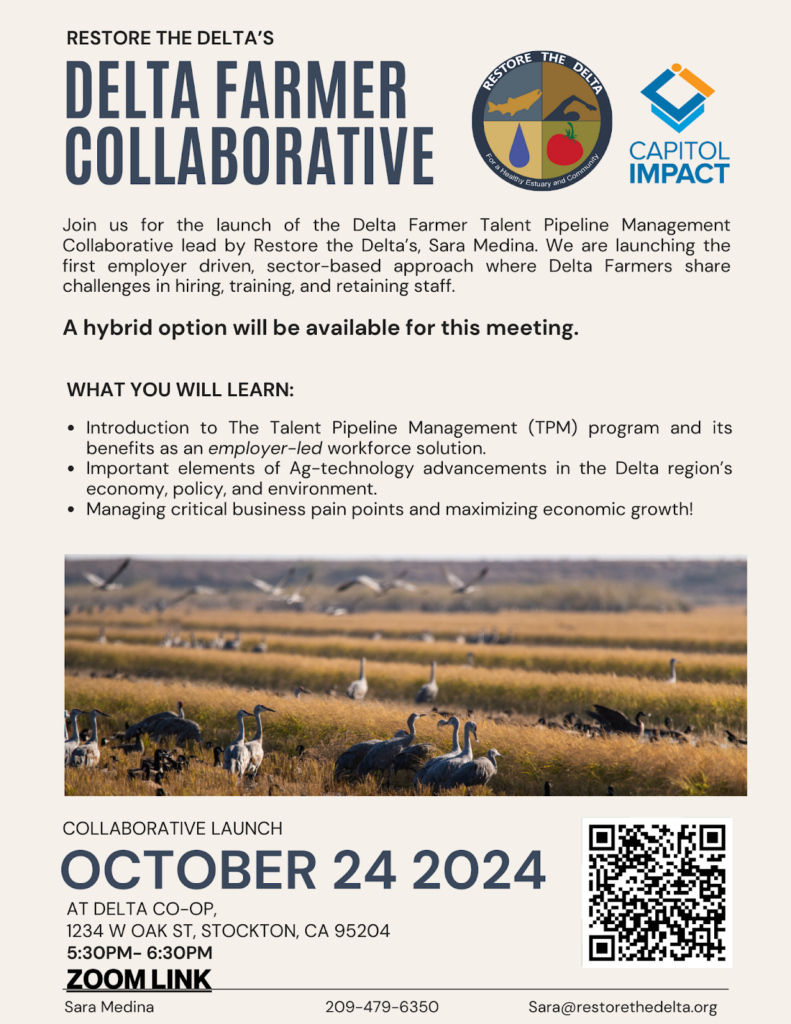It might have been 100 degrees this month, and we might have broken some heat records, but that didn’t stop Delta farmers!
Delta Tunnel Update:
Environmental Groups Call Attention to Fundamental Flaws with Delta Conveyance Project Hearings.
The Delta Tribal Environmental Coalition (DTEC), alongside several environmental organizations, submitted a formal statement to the State Water Resources Control Board opposing the Delta Conveyance Project (DCP). They argue that the Department of Water Resources (DWR) is seeking to extend expired water rights permits by 55 years without proper public review, which would further harm Bay-Delta Tribes, marginalized communities, and the ecosystem. The coalition demands the State Water Board reject DWR’s petitions and prioritize water quality standards and environmental protections. The Board will consider these concerns during a pre-hearing conference on October 17.
Read the full press release here
Have you had the chance to read our Rice Growing Handbook?
Growing rice in the Delta
During SAP’s first year, we identified subsidence as one of the most critical challenges Delta farmers face. As we conducted further research, it was discovered that Rice farming helps mitigate subsidence so we developed a Rice Farming Handbook to address these challenges.
Rice farming makes sense in the Delta for several reasons:
Subsidence Reduction: Rice farming, through water management, helps reduce subsidence by replenishing groundwater and restoring soil health, which amends the effects of water extraction.
Workforce: Rice farming supports the local labor market, providing stable, seasonal jobs and opportunities for skill development in agricultural practices.
Carbon Sequestration: Flooded rice fields act as carbon sinks, helping to capture and store carbon dioxide, which contributes to climate change mitigation.
Waterfowl Benefits: Rice fields provide a habitat for waterfowl and other wildlife, enhancing biodiversity in the region.
We would love your input on this document, as we aim to update it annually. Your feedback would be greatly appreciated!
We look forward to your thoughts and suggestions!
Restore the Delta Note: Click the image above to view a virtual version of the Rice Farming Handbook!
Join Our Delta Farmer Talent Pipeline Management Collaboration!

In SAP’s first year, we sought to understand what farmers’ biggest pains were. How they were keeping up with the changing economic climate and how it affected farmers in the Delta. There were three recurring themes; low labor return rates, subsidence, and rising costs of operations.
To address your talent pain points and revolutionize your business growth, we’re excited to invite you and your company to join the Delta Farmers Talent Pipeline Management (TPM) Collaborative! This is an employer-led and data-driven initiative utilizing the Talent Pipeline Management (TPM) model developed by the U.S. Chamber of Commerce Foundation. To date, major companies like Kaiser Permanente and IBM have used the TPM model to solve talent pain points in their region.
The Opportunity
As a Preferred Employer in the Delta Farmers Collaborative, your company will receive expert support to diagnose talent pain points and build regional talent solutions with vetted education providers that will directly serve your talent needs. By joining this free Employer Collaborative, you’ll gain access to:
Data-Driven Talent Forecasting and Insights: Receive a live dashboard of regional employer-level talent supply and demand data of your critical occupations and expert guidance to understand your specific talent needs and develop targeted solutions.
Strategic Industry Collaboration: Collaborate with fellow ag leaders to share challenges, solutions, and best practices in a confidential setting.
Customized Talent Supply Solution: Receive tailored training and resources to address your unique workforce development needs.
If you’re an interested Delta Farmer who wants to be part of this collaborative. Please contact our Sustainable Agriculture Program Manager, Sara Medina at Sara@restorethedelta.org.
Calling All Delta Farmers: Shape the Future of Agriculture with Drone Technology!
At Restore the Delta, we are excited to introduce a new drone program tailored for Delta farmers. Last year, we surveyed farmers like you across the Delta, and several recurring challenges emerged- such as low labor returns, levee maintenance, and water management.
Through research, we’ve found that drone technology can offer innovative solutions to these challenges. Drones can assist with the early detection of issues, provide real-time data for better water and pest management, and monitor levee conditions.
We need your input to ensure this program meets the needs of Delta farmers.
How do you see drone technology fitting into your operations? What challenges could drones help you overcome?
Your experience and insight are crucial in shaping this program, and we want to hear from you. Please take a few minutes to fill out our survey and share your thoughts. Your feedback will directly influence the future of this initiative and contribute to building a stronger, more resilient Delta farming community.
Join an innovative movement in Delta agriculture and have your voice heard!
Resources
There are several exciting funding opportunities available for Farmers in the San Joaquin aimed at reducing emissions and supporting sustainable practices! These programs represent crucial steps toward a cleaner, more efficient future for agriculture in the region:
Technology Advancement Program
The Technology Advancement Program (TAP) is a strategic initiative encouraging innovation in emission reduction technologies, offering ongoing reviews, interagency partnerships, and funding to advance local research and development.
The Dairy Plus Program, launched by the California Department of Food and Agriculture (CDFA), provides competitive grants for advanced manure management practices to reduce methane emissions and nutrient surplus on dairy farms, backed by $75 million from the USDA.
Funding Agricultural Replacement Measures for Emission Reductions (FARMER)
Lastly, the FARMER Program supports agricultural equipment upgrades, offering financial assistance for cleaner harvesting machinery, tractors, and other operational equipment, further contributing to emission reductions and environmental sustainability in agriculture.
Fall Events
November 1 – November 3
Sandhill Crane Festival in Lodi
Lodi’s 25th annual Sandhill Crane Festival is the place to see sandhill cranes in all their glory. Join us at the event from November 1 through November 3 for a chance to see cranes in their natural habitat!
Nov 9
CAFF – Stockton Farmer Listening Session 2024 in Stockton
CAFF invites farmers to join us for a casual conversation about challenges, concerns, and ideas to improve our food and agricultural system and to better support your farm. Feedback from this event will shape CAFF’s policy agenda for the year ahead, guiding our advocacy efforts to make sure that we’re fighting for what matters most to you.
December 8
Christmas on the Farm in Brentwood
Volunteers are needed for the East Contra Costa Historical Society’s event. Here are photos from the 2021 event, and to get involved, email ecchs@eastcontracostahistory.org. It runs from 11 a.m. to dusk at the museum in Sellers Avenue, 3890.
Dec 7th and 8th
Festival of Trees in Lodi
Enjoy performances by local artists, pick up an evergreen swag made by the Docent Council members, and stroll the 18 acre grounds to view the beautifully decorated holiday trees.
Kids’ crafts and a picture with Santa help make Festival of Trees a memorable time for the whole family.


